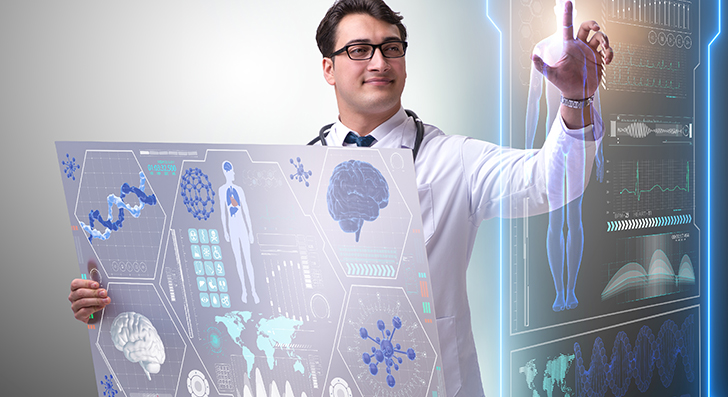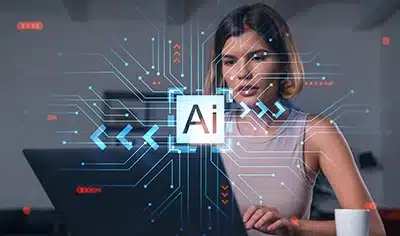Generative Artificial Intelligence (AI) has emerged as a disruptive force within the realm of healthcare, transforming the unbelievable into a tangible reality. This groundbreaking technology not only analyzes large volumes of unstructured datasets abound in healthcare but also decodes complex patterns to enhance diagnostics, treatment, and research.

According to reports, the impact of Generative AI is felt far and wide, profoundly altering the healthcare landscape. Furthermore, this disruptive technology comes with an innate potential that allows healthcare organizations to tackle administrative and operational challenges while empowering researchers and clinicians to focus on higher-value tasks. No wonder, there has been a rising demand for this emerging technology in the healthcare sector. In fact, a recent report indicates that the global market for Generative AI in healthcare is estimated to reach 30.4 billion USD by 2032 at a CAGR of 34.9% during the forecasted period.
Generative AI Use Cases in Healthcare
1. Diagnostics and Medical Imaging
Generative AI in healthcare has ushered in a new era of accuracy and efficiency. By leveraging the potential of Machine Learning algorithms, Generative AI simplifies the interpretation of complex medical images such as CT scans, MRIs, and X-rays. Since the technology excels in pattern recognition, clinicians can employ it for the early detection of diseases with a level of accuracy that surpasses traditional methods.
The interesting thing about Generative AI is that it can not only help clinicians identify subtle patterns indicative of various medical conditions but also learn and adapt continually from disparate sources of unstructured datasets they are trained on, resulting in improved diagnostic capabilities. Furthermore, the integration of this transformative technology in medical imaging reduces the likelihood of human error and provides healthcare professionals with critical insights for quick and accurate decision-making.
2. Personalized Treatment Plans
The role of Generative AI in personalized medicine represents a transformative approach enabling clinicians and healthcare professionals to tailor medical treatment plans to the unique characteristics of individual patients. In other words, Generative AI can identify patterns and correlations by analyzing a wealth of patient-centric data such as historical health records, lifestyle factors, and genetic information to tailor treatment plans. Personalized medicine powered by Generative AI ushers in an era where treatment plans are tailored to improve the quality of healthcare resulting in better health outcomes.
3. Behavioral Health Monitoring
Generative AI is widely used by healthcare professionals to monitor and assess individuals’ mental health and well-being by analyzing various behavioral cues such as facial expressions, speech patterns, and even physiological signals. By leveraging advanced Machine Learning algorithms, Generative AI can identify subtle indicators pertaining to various mental health conditions, enabling early detection and timely intervention. In other words, the technology provides a proactive approach to enhance the efficiency of mental health assessments contributing to a more holistic and patient-centered support for individuals dealing with mental health challenges.
4. Natural Language Processing in Healthcare Records
Generative AI is bringing a paradigm shift in the landscape of healthcare records through its Natural Language Processing (NLP) capabilities. The technology leverages advanced algorithms to understand and analyze large volumes of unstructured data, such as clinical notes, medical literature, and electronic health records (EHRs). In other words, the technology excels at extracting meaningful insights from voluminous datasets, facilitating seamless information extraction and interpretation, identifying patterns, and improving clinical decision-making. In a nutshell, the technology empowers clinicians and healthcare professionals with easily accessible, valuable, and contextually rich information to streamline administrative tasks while improving patient care.
5. Virtual Health Assistants
Another promising application of Generative AI in healthcare is the development of virtual health assistants. These AI-powered assistants offer interactive and personalized support to individuals, creating a bridge between patients and healthcare services. In other words, these assistants offer end-to-end support on medication reminders, personalized health advice, general health inquiries, lifestyle recommendations, and more. This not only improves patient engagement but also contributes to improved healthcare outcomes by fostering an accessible and more patient-centric healthcare experience.
How Conversational Artificial Intelligence Drives Better CX
Key Challenges of Generative AI in Healthcare
Generative AI has an innate potential to transform the healthcare landscape but it comes with several challenges that need to be addressed for effective implementation. Listed below are some key challenges.
a) Data Security and Privacy
The healthcare sector deals with highly sensitive data, and maintaining data security and privacy is a key concern. When using Generative AI applications, it is important to ensure that they adhere to security protocols to safeguard patient data. Furthermore, ensuring compliance with regulations such as HIPAA is also critical.
b) Ethical Considerations
The deployment of applications powered by Generative AI for healthcare raises ethical concerns, especially in areas such as decision-making and patient outcomes. Addressing accountability issues, transparency, and fairness in treatment recommendations becomes critical to ensure ethical use.
c) Integration With Existing Systems
The integration of Generative AI applications with existing healthcare infrastructure poses a significant challenge. Ensuring interoperability, compatibility, and seamless integration into established workflows requires careful planning and execution.
d) Resource Constraints
Developing and deploying Generative AI applications requires a wealth of experience and expertise. Healthcare institutions may face resource constraints in terms of skilled personnel.
Overcoming the challenges of Generative AI in healthcare requires a multifaceted approach encompassing data security and privacy, regulatory approval, ethical considerations, integration with existing systems, and resource constraints. Collaboration with experts in this field will not only address the challenges but also pave the way for the responsible and effective integration of Generative AI in healthcare settings.
Navigate the Generative AI Landscape
Summing Up
The fearless foray of Generative AI into the healthcare industry has brought significant advancements and unlocked a sea of opportunities. From medical imaging and personalized treatment to behavioral health monitoring and virtual health assistants, the technology has the potential to revolutionize healthcare and improve patient outcomes. As we continue to explore the capabilities of this disruptive technology, it becomes critical to acknowledge the ethical considerations and challenges that come along with the integration of Generative AI into healthcare.





